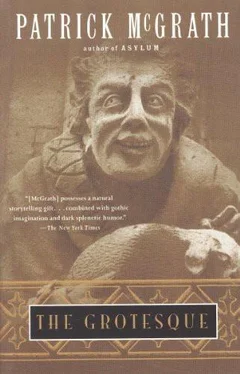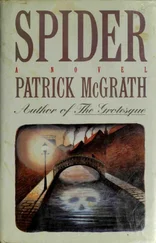These, as I say, were the last of the good days, and I think often of them now, for I wonder if anything occurred then that might have warned me about what was to come. I was unaware at the time of Fledge’s designs; I knew only that he displayed toward me a good deal less of the deferential respect than I had a right to expect from my butler, but of his evil I was still ignorant. And other than his presence, and Doris’s, all was as usual in Ceck and environs. There was the business with Sykes-Herring, of course, but that was nothing new; I’d been warring with the Royal Society for years. I telephoned the man a day or so later and made an appointment to see him two weeks hence. He was smoothly affable to me, deeply regretted, so he claimed, the “unavoidable postponement” of my talk, treated me, in short, with the sort of patronizing smugness that the gentleman naturalist must expect from his “professional” colleague in these times. The problem is, men like Sykes-Herring, themselves blinkered, find the breadth of vision of a naturalist like myself acutely threatening, for, as a function of their long formal training, they are devoid of the most vital of scientific attributes, imagination. They bring too much categorical and theoretical baggage to the task, they see what they expect to see and no more. The gentleman naturalist, by contrast, has an open-minded and theoretically eclectic attitude toward natural phenomena, and is thus far better equipped for informed, imaginative speculation. He is far more likely to make the sudden brilliant intuitive leap to revolutionary truth. This is why I have always had such trouble with the Royal Society, with men like Sykes-Herring; this is why they accuse me of mixing up my bones, why they refuse to publish my papers, why they sabotage my lectures. They practice safe science, and safe science to my mind is no sort of science at all.
All this I had of course long been aware of. Nevertheless, Sykes-Herring’s letter, and the animosity that lay behind it, disturbed my concentration, for I found myself during the days that followed unable to spend more than an hour or two at any one time with the bones. The whole business, my lifework, Phlegmosaurus: a sense of bitter futility impregnated all my thoughts, and I simply could not stay with it with any sort of zeal.
I spent many afternoons in the Hodge and Purlet during this period, but I don’t want to give you the impression that I always returned to Crook in the wistful, elegiac mood I have just described. In fact, it was only on that one occasion it occurred, I believe, which is probably why I remember it. No, after a few hours in the public bar I tended to come home in a fractious, irritable state of mind; day drinking always makes me irritable, for some reason. I would look for trouble. I would pick on people (usually Sidney). I’m rather sorry, then, in the light of what happened, that on the notable evening that Sidney and Cleo announced their engagement I did not respond very graciously. This I regret not only because I hate at any time to give Cleo pain, but also because it was, for Sidney, one of the last moments of happiness he would know.
We always dress for dinner in Crook, and I prefer candlelight to electric light in the dining room. The meal thus tends to be an affair of rather gloomy formality (and this, frankly, is altogether to my taste). Fledge was striking the gong as I emerged from my bedroom in the east wing, and as I clattered down the stairs I heard Harriet and Sidney and Cleo leave the drawing room with a gush of giggles and excited whispering, and cross the hall to the dining room. What, I asked myself, are they all so happy about? Probably still discussing whether Sidney looked more like a ferret or a lobster.
Mrs. Fledge had made us one of her shepherd’s pies. She makes a fine shepherd’s pie, the meat bubbling gently in its own juices and the mashed potato on top whipped up like a choppy sea, its little crests crisply browned under the grill. All through soup (we had Heinz canned tomato soup) I’d been aware of a sort of suppressed giddiness in Sidney and Cleo—frequent glances across the table, grins and snorts and so on, and I knew something was afoot, though I was not particularly interested in what. Fledge served the shepherd’s pie from the sideboard, and then came round the table with the runner beans; and barely had I washed down the first mouthful with a draft of burgundy than Harriet said: “Hugo.”
Here it comes, I thought. “Yes?”
“Sidney has something to tell you, dear.”
I glanced over at the boy, pushing a small mound of meat, potato, and runner bean onto the end of my fork as I did so. Even in this dimness I could see him blushing. His fingers—Sidney had rather long, thin fingers—fluttered to his horn-rims, then touched his hair, which was combed sleekly back from his forehead and oiled so heavily that it gleamed in the flickering candlelight (it was this sleekness, I presume, that had provoked all the ferret-and-otter nonsense). He looked across at Cleo and tittered. “One feels so silly,” he said. “You tell him, darling!”
Cleo had her arms flat on the table and was leaning forward toward the boy, grinning. Her eyes were alight. She shook her head slightly and said nothing. She was enjoying his embarrassment.
“Come on, Sidney,” I said, dabbing at my lips with my napkin and swallowing more burgundy, “spit it out.”
“Yes, Sidney,” said Cleo, “spit it out.”
He controlled the wave of hysteria that this remark evidently provoked. “Cleo and I,” he began; and then, turning to Harriet: “Oh I can’t, Lady Coal, I simply can’t!”
“What Sidney is trying to say,” said Harriet, “is that—”
“That Cleo and I want to be married!”
I allowed a small silence to occur. “You do,” I said at last. “Yes, Sir Hugo,” he said, gazing at me now with an expression of great earnestness and trying not to look at Cleo. “Not immediately, of course, we can’t afford to, immediately, but we should like, that is, with your blessing, of course, to, ah, announce our engagement.” Then he permitted his eyes to drift back across the table to Cleo’s, and the pair of them grinned at each other in the candlelight, and he stretched out a fluttery hand and laid it upon hers. Harriet gazed at me with a sorr of expectant complacency, but I was concentrating on the assembly of neat forkfuls of meat, potato, and runner bean, each followed by a swallow of burgundy. They all awaited my response. Fledge loomed over by the sideboard, still and impassive in the shadows. I lifted my glass and the candle flames caught the crystal facets and darted off in all directions in thin sharp glinty spears of light. Fledge floated over with the decanter and refilled me. I was thinking of the evening I proposed to Harriet. I had had to go to her father, the colonel—Herbert—in his study after dinner, and quite an ordeal it was too. The old man had questioned me briskly about my prospects, and afterwards we had smoked cigars and talked blue-chip stocks by the fire. Apparently one didn’t go about it like that anymore; apparently one now did it over dinner, in front of the servants, with grins and giggles. And to this piece of levity I was expected to give my blessing; Harriet clearly expected this; I’d have thought she knew me better than that.
My eyes were on my plate; my knife and fork were busy. “Prospects?” I murmured, without looking up.
“I beg your pardon, Sir Hugo?” Sidney’s hand fluttered off Cleo’s and dabbed at his spectacles, then at his hair.
I lifted my head, raised my eyebrows, and said again, quite mildly: “Prospects. What are your prospects, Sidney?”
“Oh darling, I hardly think we need go into that now,” said Harriet, suddenly sensing danger.
Читать дальше












